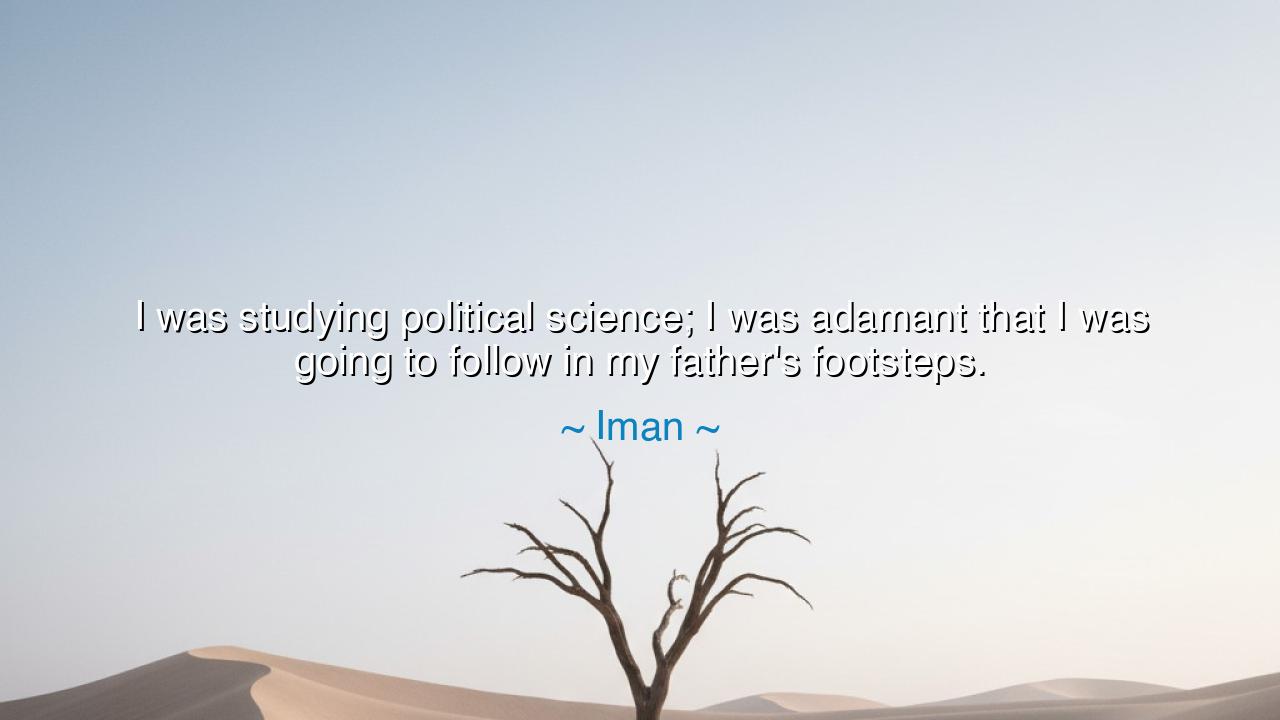
I was studying political science; I was adamant that I was going
I was studying political science; I was adamant that I was going to follow in my father's footsteps.






Hear, O children of wisdom, the words of Iman, who speaks of a time when she, like many before her, sought to follow the path set before her. "I was studying political science; I was adamant that I was going to follow in my father's footsteps." These words carry with them the weight of tradition, of the desire to honor the legacy of one’s forebears, and the inner struggle that all must face when their own path calls them in a direction different from that which was expected. To follow in the footsteps of a parent is both an act of love and duty, but the heart often yearns for its own destiny, a destiny that may not always align with the visions of others.
In ancient times, there was a belief that the family was the foundation of society, and that each member had a role to play, often shaped by the generations before them. The ancient Greeks, for example, saw the continuation of one’s lineage as central to the individual’s purpose. Sons were often expected to follow the careers of their fathers, to continue the work that had been started long before their birth. But even in those times, there were those whose hearts burned with a desire to carve out their own paths, to live for themselves rather than simply to fulfill the expectations of the past. Iman's words reflect this universal struggle—the tension between honoring tradition and finding one’s own calling.
Consider the story of Socrates, the great philosopher, who rejected the traditional paths laid before him. Socrates was born into a family of stonemasons and was expected to follow in his father’s trade. Yet, his soul yearned for something different. Instead of shaping stone, he sought to shape minds, challenging the very foundations of Athenian society. Though his father’s path was honorable, Socrates knew that his own calling was to question and to teach. It was not an easy choice—he faced ridicule, opposition, and ultimately death. Yet, Socrates' decision to walk a different path led to the birth of Western philosophy, a legacy that transcended the expectations of his time. His story serves as a reminder that following the heart’s call may lead to greatness, even when it strays from the path set by those who came before.
But the path of following one’s own heart is not an easy one, O children. There are great sacrifices involved. The world will often try to pull us in different directions, especially when it comes to the expectations of our families and society. To follow in the footsteps of a parent is to embrace a tradition, to carry the torch passed down through generations. But as Iman so wisely shows us, the heart often knows a different truth, one that calls us to pursue our own destiny. This is the challenge faced by many who feel the pressure of family legacy but also the pull of their own passion. The journey is never clear-cut; the road will be filled with doubt, fear, and regret, but it is the path that the heart chooses that leads to self-discovery.
In Iman’s case, she was studying political science, and her mind was set on following the path her father had laid before her. Perhaps, like the ancient ones, she sought to honor her father’s legacy, to fulfill what had been envisioned for her. Yet, in the heart of every seeker, there is always a question: "Is this truly my path?" Just as Leonardo da Vinci was expected to follow his father’s footsteps into a life of apprenticeship, he instead sought to become a master in his own right, blending the worlds of art and science in ways no one had ever imagined. Though his family may have wished for him to follow a more traditional route, Leonardo knew his true calling was something greater.
And so, O children of the future, let Iman’s story teach you the importance of listening to the call of your own heart. It is not enough to follow the path laid out by others, no matter how much love or duty may accompany it. The soul has a voice, and it will not rest until it is heard. There is a time for honoring the past, but there is also a time to forge a new future, one that is uniquely your own. You may walk a road that others have walked before you, but remember that the path of greatness is often the one that is still being written. The world needs individuals who are brave enough to dream their own dreams, to embrace their own calling, even when the way is uncertain.
Take this lesson to heart: There will be moments in your life when you must choose between following the expectations of those who love you and walking your own path. Know that to live authentically is the greatest act of courage. Like Socrates, like Iman, and like all those who came before you, you must learn to honor the heart’s desire while respecting the wisdom of the past. Be bold in your journey, for it is in finding your own voice, your own truth, that you will contribute to the world in a way no one else can.






AAdministratorAdministrator
Welcome, honored guests. Please leave a comment, we will respond soon